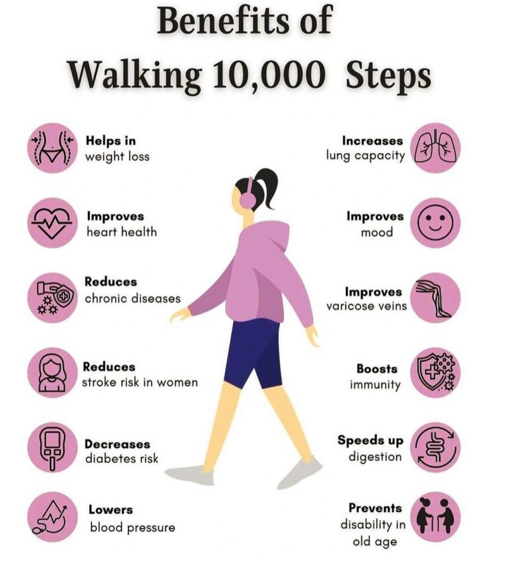Walking is one of the simplest yet most effective forms of physical activity, especially for older adults. As we age, maintaining mobility and overall health becomes increasingly important, and walking provides a low-impact exercise option that offers numerous physical, mental, and social benefits. Below are some of the key advantages of walking for older adults:
Improves Cardiovascular Health
Regular walking can strengthen the heart and improve blood circulation. For older adults, this helps reduce the risk of heart disease, high blood pressure, and stroke. Studies show that even a modest amount of walking each day can contribute to better heart health and increased longevity.
Strengthens Muscles and Bones
As we age, our muscles and bones naturally weaken, increasing the risk of falls and fractures. Walking helps to maintain muscle tone, strengthen bones, and improve balance. It is especially beneficial for preventing conditions like osteoporosis and sarcopenia (muscle loss).
Enhances Joint Health
For those with arthritis or other joint issues, walking can help keep joints flexible and reduce stiffness. It lubricates the joints and supports the development of stronger connective tissues, reducing discomfort and maintaining mobility.
Aids in Weight Management
Maintaining a healthy weight can become more challenging as metabolism slows down with age. Walking is an excellent way to burn calories and prevent unwanted weight gain. Regular physical activity can also improve metabolic health and help reduce the risk of type 2 diabetes.
Boosts Mental Health
Walking has profound mental health benefits. It can help reduce symptoms of anxiety and depression by boosting endorphin levels. For older adults, this is particularly important, as mental health issues such as loneliness and depression are more common in this demographic. Walking outdoors, especially in nature, can enhance mood and provide a calming effect.
Improves Cognitive Function
Research has shown that physical activity, such as walking, can improve brain health and cognitive function. Walking helps stimulate blood flow to the brain, which may help slow cognitive decline associated with aging and reduce the risk of dementia and Alzheimer’s disease.
Promotes Social Interaction
For many older adults, walking provides an opportunity to engage with others, whether through walking clubs, group activities, or simply meeting neighbours.. Social interaction is key to maintaining emotional well-being and can help reduce feelings of isolation.
Enhances Balance and Coordination
Falling is a significant concern for older adults. Walking regularly improves coordination and balance, reducing the risk of falls. It strengthens the core muscles, which are essential for maintaining posture and stability.
Supports Better Sleep
A regular walking routine can improve sleep quality. For older adults who often struggle with insomnia or restless sleep, light physical activity like walking can promote more restful and longer-lasting sleep by helping to regulate the body’s circadian rhythms.
Boosts Immune Function
Walking can improve immune function by stimulating the body’s defense mechanisms. This helps older adults fend off infections and illnesses, especially during cold and flu season.
Tips for Starting a Walking Routine
- Start Slowly: For beginners, it’s important to start with short, manageable walks and gradually increase the duration and intensity.
- Wear Comfortable Shoes: Proper footwear is essential to prevent blisters, discomfort, and injury.
- Stay Hydrated: Older adults should make sure to drink enough water before and after walking, especially in warmer weather.
- Walk with a Buddy: Walking with a friend can provide motivation, enhance safety, and make the experience more enjoyable.
- Pay Attention to Weather Conditions: Be cautious of extreme temperatures, and choose to walk indoors at a mall or gym during unfavourable weather.
Conclusion
Walking is a powerful tool for maintaining health and well-being in older age. Its low-impact nature makes it accessible to almost anyone, and the numerous physical, mental, and social benefits make it an essential part of a healthy lifestyle. For older adults, the key to enjoying these benefits is consistency—taking regular walks can lead to a longer, healthier, and more fulfilling life.



